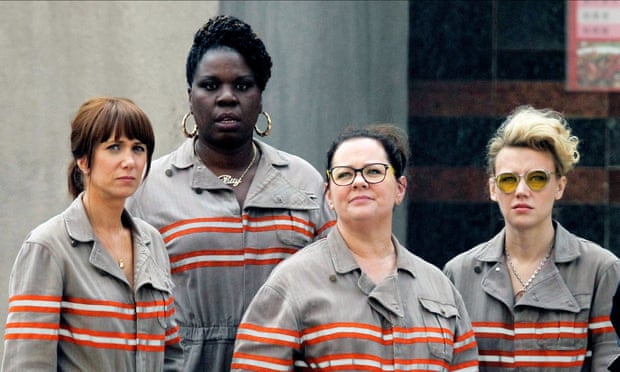The angst surrounding Paul Feig’s gender-flipped Ghostbusters reboot feels especially idiotic in the context of the film itself. Fittingly, the movie’s legacy seems destined to come down to the outrage that greeted its casting announcement, trailer debut and, now, theatrical release – to how its very existence, as a female-led restructuring of an old comedy favorite, inspired the depths of male Internet fandom to come out in droves and bloat the comment sections of blogs and websites. There’s not much of a story to tell otherwise. After all, the original film on which this misogynistic crusade is based is merely an effective goofball comedy with an iconic theme and a killer Bill Murray turn. Its remake isn’t any better, but I suppose it isn’t much worse, either.
In fact, it’s best to view this as a referendum on the creatives involved, as opposed to those behind its source material. For starters, it’s hardly demonstrative of what Paul Feig is capable of. Here’s a director who has mastered the studio comedy formula in a way few, if any, of his generation have; he managed a full-on classic in Bridesmaids and came close – speaking of the work from Rose Byrne and Jason Statham – in Spy. Feig’s Ghostbusters hews closer to The Heat, another post-Bridesmaids action pic, as an overloaded, well-mounted and relatively broad effort. It’s sharpest when left to the low-key moments between its cast – Kristen Wiig, Melissa McCarthy, Kate McKinnon and Leslie Jones – and weakest when guided by plot. Feig is also extremely comfortable when it comes to waiting for laughs, rendering his new film admirable but also somewhat deadened in the humor department. This Ghostbusters is without not only a standout comic sequence, but also any evidence of an attempt at one.
To be clear, nothing here is outright bad, or even mediocre. Ghostbusters is pleasant and intermittently crackling in its new incarnation, moving along with an assured tone and some surprising moments of visual beauty. It just never gels: a stretch near the end of the film introduces the spookily playful aesthetic that’s called for (to no avail) throughout the hour that precedes it. It’s that lack of follow-through – coupled with the lack of unpredictability – that sticks out. The hype surrounding the film’s release is difficult to push aside in that regard, but even so, everything here is played awfully safe; the varied, exceptionally talented cast – particularly McCarthy and Wiig, who have thrived in Feig’s past movies – feels wasted. Jones gets too little to do, both McCarthy and Wiig have to go at it mostly straight, and McKinnon, outrageously good as she is, doesn’t get a complete character to work with. The movie makes a series of unnecessary choices between substance and funny, specifically in the case of its alienated-white-guy villain, whose thematic significance far outranks his comic value. (This is not usually problematic for Feig, who tends to give his antagonists ample material to work with.)
Better is the movie’s observational tendencies, and Feig’s refusal to weigh his work down with overbearing cameos and overwrought set pieces. Indeed you could call this the film’s blessing and curse; it never takes off, but it’s always headed down the right path. Once Jones – whose introduction as a “recruit” mirrors Ernie Hudson’s in the original – finally joins the crew after leaving her job at the New York MTA, the laughs come in easier and more frequently. These actresses have a natural rapport that’s – at times – unexpectedly, intensely effective. They each have their quirks, from Jones’ obsession with New York history to McKinnon’s consummate command of supernatural activity, and while they’re undeniably simplistic – this is a studio remake, after all – there’s a rare exhibition of restraint in their dynamic.
Jones and McKinnon mostly stick to what they do best – their characters could reasonably be argued as extensions of their Saturday Night Live personas – and, given that they’re both immensely gifted comedians, it works to the film’s advantage. Jones has the unique ability to be weave between deadpan and boisterous, while McKinnon’s skill at constantly sliding into frame with an unorthodox smirk or thought pushes Ghostbusters into the unconventional territory it otherwise skirts. Each makes the most of their role. (As does Chris Hemsworth, who’s pretty brilliant as the Ghostbusters’ incompetent secretary.) But I’m not sure that I can say the same of McCarthy and Wiig; there’s a great deal more depth to their characters, but neither actress is best-suited to the “straight woman” material they’re primarily tasked to play. The central focus on their characters' friendship is admirable – and the utter absence of any love interest refreshing – but, by midpoint, it hits the same points with unfortunate redundancy. And it’s all too familiar, anyway. There isn’t enough to establish real emotional weight.
Which, again, isn’t the worst thing in the world. It has been a dispiriting year for big-budget screen comedies, with room for harmlessly broad product but not a whole lot else. Ghostbusters fits into that sphere, and on reflection seems to offer precisely what was promised by the notion of a Ghostbusters reboot. The film throws in virtually all of the necessary cameos with breezy fun, cues some visual and narrative homages without drawing too much attention to itself, and makes room for a litany of great character actors including Michael K. Williams, Zach Woods and Cecily Strong. It’s not a difficult movie or a risky effort. It’s so mildly amusing that the idea of it as particularly divisive verges into the absurd. Put another way, any and all of its disappointments refer to what we know this director and these actors are capable of – on those counts, this Ghostbusters doesn’t quite deliver. But as a worthy remake of a screwball classic? It does just fine.
Grade: B
